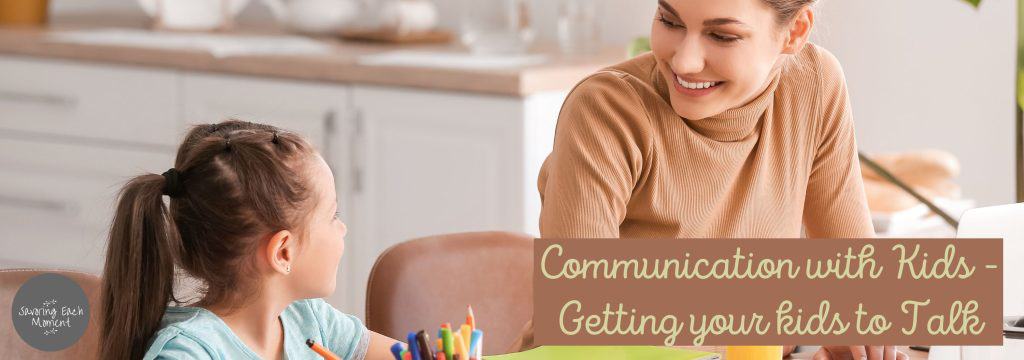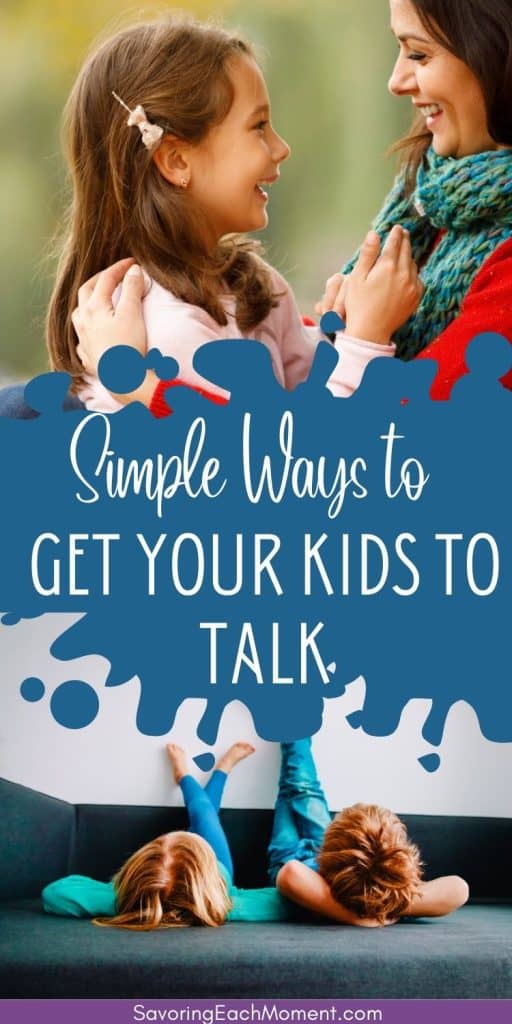Encouraging communication with children and learning how to get your child to talk is something that happens over time. There’s no magic equation or formula that you can implement when communicating with your kids, but there are some simple ways to establish effective communication with your children.

This post may contain affiliate links. That simply means that I may receive a small commission when you purchase something through the link at no additional cost to you.
Communication with Children
Being a parent is one of the hardest and best jobs there is. Hardest, because there is no manual, and even if there was, every child would need a different book of directions for how to raise them.
Developing a positive way to communicate with your kids is one of the fundamental sections that should be in your “how to raise a child” manual. But it’s not there. So, you have to find ways to develop effective communication with children that will be open, and productive.
RELATED: How to Talk to Kids Will Listen/How to Listen so Kids will Talk
The “Talking Stool”
We have been working on a kitchen remodel and there’s one thing that I refuse to give up. My cupboards were from the 80s and too skinny to fit my dishes into and close the doors. The countertops were ugly and dark with chips in the laminate. The floor had squeaks under the cheap “wood” flooring that a previous occupant had installed. All of those things were happily going away!
All of it was going to be new. All, except for our old kitchen stool.
This kitchen stool has been dubbed “the talking stool” and for years, it has resided in the kitchen. It’s just an ordinary bar stool with no back. It doesn’t work well for getting things out of tall cupboards, it’s just a plain round seated stool for sitting on at a high counter. There is only one and it doesn’t match anything else in the house.
But, in our house, it’s a special seat! I don’t remember how it became special or the first time I realized its value, but it has been the one place where both of my daughters have poured their hearts out to me over the years.
When we would get home from school and I’d start making supper, very often one of them would come and sit on that stool and begin telling me about their day. About their friends. About the fun things and the heartaches.
I expected them to help with getting supper ready but if they were sitting there, they were talking and sometimes that was so much more important than cutting up the lettuce for a salad!
Over the years I heard about their boyfriends, about their friends who were struggling with feelings of insecurity and how to help them, about challenges with their teachers, questions about faith, and how to deal with their own conflicting emotions as they grew up.
This stool was a place where whoever was sitting there, had my ear. Of course, they could talk to me anytime or anywhere else, but this seemed to be the place where it all came out.
RELATED: Simple things You Should do with Your Child Everyday!
Daily Communication with Children
As a parent, you can’t always make your child tell you what’s going on in their heart and head. Sometimes, the more you push and question, the less they will say. But this stool, while I was making supper or doing the dishes afterward, opened the conversations.
I vividly remember one day in my kitchen when my daughter sat down on the talking stool. She had been having stomach aches for weeks. Often she couldn’t eat because her stomach hurt so much. We had been to the doctor, done blood work, done several other tests and everything was normal – except she still had stomach aches.
Finally, one day, she told me that she had been staying up off and on during the night on her phone because her friend had been talking about suicide and my daughter felt that it was her job to keep her talking through the night.
It was a process, but the friend was able to get help, my daughter was able to sleep at night again, and the stomach aches finally went away. Even though we had spent hours talking and listening and she frequently sat on the talking stool, it took time and trust for her to be able to share this dark secret she was holding for her friend.
My daughter knew there would be consequences for sharing because her friend had sworn her to secrecy. But as she talked and we made plans together, we were able to get help for her friend and take away the responsibility for keeping someone alive each night from my daughter’s shoulders and place it where it should be – with professionals who were trained to help.
RELATED: Getting Your Kids to Talk to You
Encouraging Communication with Your Children
As your children are growing up, it’s important to have consistent ways that they can communicate with you. Safe places where they can talk, cry, process, and listen.
A few years ago, we were moving to a different state. I was sorting through many things and getting rid of things we no longer needed. My oldest daughter, who had just gotten married, told me “Mom, you have to take the talking stool with you!”
Now, in her apartment, she has found a very similar bar stool and proudly has it sitting in her kitchen. When I went to visit her recently she proudly showed me that she has a “talking stool” in her kitchen too.
When you make conversation and listening a priority, you build a culture of value and sharing with your kids. Communication with your kids isn’t something you can force, but when it happens, you can definitely encourage it.
RELATED: Conversation Starters for Families

How to Get Your Kids to Talk
Here are three tips for building a relationship of communication with your kids. Communication with children isn’t that much different from communication with adults, but it is a habit you need to build on through the years. Effective communication with your child is built over time.
Listen
I know this sounds obvious, but so often when our kids start to talk we criticize, redirect, or try to fix or correct their feelings or thoughts. Sometimes they just need to talk and hear themselves process knowing that we are going to listen and not squash their thought process.
When we listen to our children talk, we are validating their feelings, their emotions, and their fears. We can hear between the lines and understand the things they might not be saying out loud but the things they are struggling with on a deeper level. When we laugh with our kids and cry with our kids, they can see how we process our emotions and work through difficult situations and this can guide them as they process their hard things too.
Ask Questions
You have to be careful with this one because sometimes asking too many questions can stop a conversation, but if your child is frustrated with a situation or person, ask them some questions to help them process the solutions or answers.
“Is there something that you can do to change the situation or make it better?” “Is there something I can do to help you?” “How do you think your friend is feeling about this?” “What is the worst thing that could happen?” “How could you prepare for that?” Questions like these help your child think through the situation and often help them much more than you simply telling them what to do.
If the time is right, share a story or situation that might be similar to when you had a challenge that you needed to deal with. Maybe you did the right thing and maybe you didn’t. Stories can help your child know that you understand how they are feeling and provide some ideas for solutions or decisions that they hadn’t thought of.
Make sure that when you are telling your story, you aren’t sharing “one better” or shifting the focus from your child’s situation to your own.
Whenever your child is talking, it’s important to let them do more of the talking. They are learning to process, trusting you with their thoughts and feelings, and hoping that they can be as smart as you are someday. That comes from lots of hours of conversation and exploring through words.
Final Thoughts on Better Communication with Children
Working on communication with children is a lifelong process. There will be times when your “talking stool” will be busy and other times when you wish you could pull it out and listen to your kids.
If communication has been difficult, give it another try. Pay attention to what it takes to get your kids to talk and take the time to really listen. It is never wasted time.
You may also like these Biblical parenting links…
- Tips for Sitting in Church with Kids
- Bedtime Prayers – Creating an Evening Routine
- 52 Memory Verses for Kids to Memorize
- Family Worship Ideas with Kids
- Morning Prayers for Families
- Teaching Kids to Pray
- 9 Powerful Prayers for Your Daughter
❣ Sign up to get our weekly email filled with encouragement, ideas, and support for moms raising kids who love Jesus! ❣

